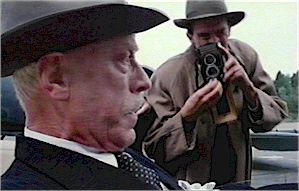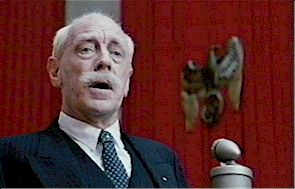| From His Olympian Heights, Deaf to the Alarm Below By
STEPHEN HOLDEN Great authors can also be colossal fools. Witness the case of Knut Hamsun, the Nobel Prize-winning Norwegian novelist and starry-eyed nationalist, who was regarded as a god in his homeland until he took up the Nazi cause during World War II. In "Hamsun," Jan Troell's epic study of the author's fall from grace, Max von
Sydow gives a career-crowning performance as the cranky, hearing-impaired writer who
marched to a different political drum from most of his countrymen. An ardent Norwegian
nationalist who swallowed whole Hitler's bombastic prophecies of a new European order in
which Norway would emerge as a major player on the international stage, Hamsun heard only
what he wanted to hear in this rabble-rousing rhetoric. He supported the Nazi occupation
government and urged young men in the resistance to abandon their cause. Hamsun's advanced age and his Olympian isolation from the everyday world had a lot to do with his disastrous miscalculation. He was already in his 70's when Hitler came to power, and because he had never read "Mein Kampf," he appears to have been unaware of Hitler's rabid anti-Semitism. The movie, which opens today at the Film Forum, touches only glancingly on the themes of his nature-loving writing, which partook of the same nostalgia for a purified, agrarian utopia as one side of the German fascist vision. Hamsun and the Nazis shared a common enemy in Britain. To Hamsun, British imperialism was a world-destroying evil force, and he argued passionately in editorials and speeches that Britain must be crushed at all costs. But this two-and-a-half-hour film, based on a book by Thorkild Hansen, is more than just a complex study of a politically self-deluded genius. It digs deeply into the seams and cracks of Hamsun's tormented marriage to his wife, Marie (Ghita Norby), a writer of children's books who was an even more avid supporter of the Nazi cause than her husband. In Per Olov Enquist's psychologically probing screenplay, the couple's rancorous quarrels resound with a deep-seated bitterness that recalls the domestic strife portrayed in Ingmar Bergman's "Scenes From a Marriage." As a family man, the film finds Hamsun fitting the familiar mode of the detached,
self-involved intellectual. The author was too consumed by his own thoughts and visions to
be a faithful husband or a caring father. But if his wife had the spirit to fight back,
his children, at once awestruck and resentful at his neglect, suffered. One daughter,
Ellinor (Anette Hoff), became a mentally disturbed alcoholic. The story begins in 1935 and follows Hamsun's deepening commitment to the Nazis, who cynically exploited him as a high-culture poster boy for their cause. His involvement builds to a climactic meeting with Hitler (Ernst Jacobi) at the Fhrer's mountain retreat. The egotistical Hamsun imagines the encounter as comparable to a meeting between Goethe and Napoleon. But an initially cordial exchange turns ugly when Hamsun presses his nationalistic agenda and Hitler loses patience and stomps out of the room. After the war, instead of being jailed for treason, Hamsun is sent to a mental hospital where he is examined by a psychiatrist (Erik Hivju) and as part of his treatment is shown movies of the Nazi concentration camps that leave him weeping and shaken. These scenes portray his official psychiatric treatment as a sinister, voyeuristic process that strips the elderly author of his dignity and self-worth with the bogus aim of trying to explain his artistic creativity. Ultimately Hamsun is tried for his crimes and fined $80,000 for "economic collaboration." Testifying in his own defense, he babbles on about how his vision of a "new Norway" made him "ecstatic" and pleads weakly, "Nobody told me what I was writing was wrong." He insists he has made peace with himself. Mr. von Sydow's Hamsun is one of the most extraordinarily rich and moving portrayals of an older person ever filmed. The film spans 17 years, until Hamsun's death in 1952, and as it goes along, the actor seems literally to shrink and wither as the years take their toll. What keeps him going is a driving mental energy that he pours into a final work, the memoir "Overgrown Paths," which his Norwegian publisher refuses to print for political reasons when Marie first presents it to him. Ms. Norby's Marie is as intense and complicated as Mr. von Sydow's Hamsun. Fiercely angry at her husband, she is also fiercely loyal to and ultimately loves this man whom she matches in stubborn willpower and spirit. The Hamsuns were the last people in the world you would call a fun couple. If "life is strife," as Gertrude Stein once said, their marriage embodied life at its fullest. |

